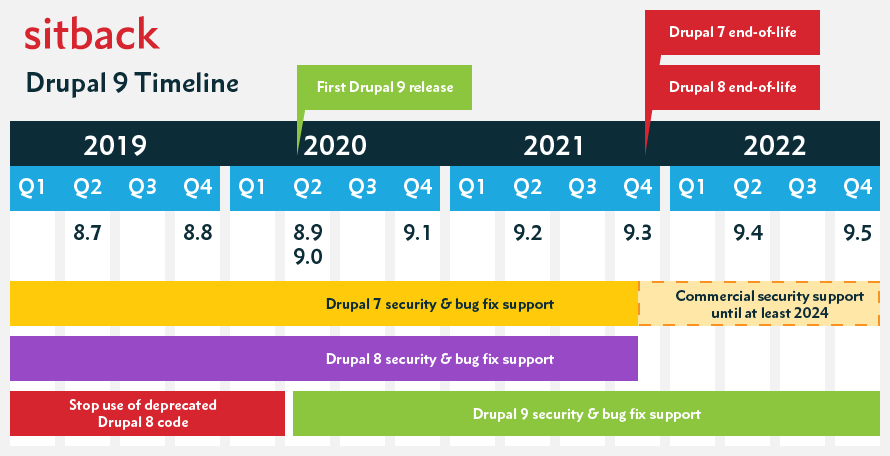When is the right time to migrate to Drupal 9?

Drupal 9 is coming: are you prepared?
Drupal 9 is almost here. This means an inevitable move from Drupal 7, and eventually Drupal 8, as support will no longer be available for either version from November 2021. Now this is important, in part due to the security issues that may occur if your CMS is not up to date, but also because especially in today’s climate, a fully functional website can take your business to the next level and have a huge impact on its success.
Due for release in June, we’re seeing lots of questions around Drupal 9 and how businesses should approach upgrading from earlier versions, so we’ve listed some of the most commonly asked questions and answers below.
What is Drupal?
Drupal is a free open source content management system (CMS) and development framework. Many website owners will be familiar with Drupal as a platform, but if you’re non-technical or new to a business that runs a Drupal site, here are the basics on why we think it’s a beautiful platform:
- It’s super flexible: there are a multitude of contributed modules and themes you can use to create the best outcome for your website, meaning just about anything you can imagine can be built and built well, if you have the right resources to support it
- It has a huge global community: one of the largest open source communities in the world in fact. So, if you have a problem, it’s likely one of the 1 million+ community members will have a solution
- It’s free: yup, free. Now, you’re generally going to need to pay for some development but saving money on the actual CMS itself means your cash can be better spent customising your vision. Depending on the skill levels and resourcing of your in-house team you may be able to get away with minimal external development resources, but for the most part agencies (like us) give you an edge when it comes to development, monitoring and keeping up to date with releases and trends – we work with loads of awesome businesses that allow us to create some truly innovative websites and applications on the Drupal platform, so chances are we’ve got a few ideas up our sleeves that will help you get the most out of your site.
- It’s the perfect tool to power your digital business: Think websites that offer a mobile first, SEO optimised user experience wrapped in a layer of security. Plus, language translation tools and dynamic content that is quickly and easily created via a drag and drop layout builder. What’s not to love?
Should I just wait and move straight from Drupal 7 to Drupal 9?
Really, it comes down to a matter of timing. With Covid-19 changing the way we work, there may be no better time than now to sit down and plan this move without distraction. If you can get started immediately, the smarter option is to move to the most recent version of Drupal 8, given it is identical in features to Drupal 9.
Once you’re up to date with the latest Drupal 8 release (currently 8.8.5) moving from Drupal 8 to Drupal 9 will be relatively easy, as the first Drupal 9 release will be identical to the final Drupal 8 release, except with deprecated code removed and third party dependencies updated.
Alternatively, as this move is a relatively big one, requiring a rebuild and migration, and the theming is completely different, you may want to take the time to phase your approach and get your ducks in a row. If you need more time to plan and will be ready to start post June, the logical choice would be to move straight to Drupal 9 and bypass Drupal 8 altogether.
Confused by the timing of all these releases? Hopefully this diagram will help:
How do I prepare to upgrade?
If you’re still running a website built on Drupal 7 (or even Drupal 6) the best time to start planning your upgrade was yesterday. The second-best time to start is today.
Meet with internal stakeholders, including senior management, finance and IT, along with any external resources to scope out your requirements and manage any objections ahead of time. It can be hard to come to a consensus when a website looks fine and appears to work well in its current state, so taking the time to lay out the ongoing benefits and future cost savings can help get your business case across the line.
With budget planning in full swing for many Australian businesses as we come to the end of another financial year, now is also the time to set aside money for upgrade work (along with any other planned changes to your website).
Engage with your web agency – this upgrade is not a simple one, so you’ll need to lock in the appropriate amount of time to see this project through, which is especially important as other businesses will be looking to do the same thing themselves. Do you want to act now or are you happy to lock in work later in the year – budgets, conflicting projects and other factors need to be considered when making this decision.
Determine which content and modules need to move across to Drupal 8. Not all modules will map directly into Drupal 8, so now is the time to work out which are needed, and which can be retired. While doing so, a thorough review of all site content should take place to ensure you’re not moving anything else across needlessly as this will give you a cleaner backend to work with.
And last, but not least, consider a UX overhaul. There are time, cost and resourcing efficiencies to be gained by looking at your website’s current user experience and incorporating improvements such as customer research, personas and user journey mapping into your new site.
How long will it take?
It can take a serious chunk of development hours to migrate, so it is worth factoring this into budgets and timelines sooner rather than later. Being a complex, but highly beneficial, upgrade it is worth putting the time, effort, and money aside to ensure your website is in its best possible state to meet your needs now and in the future.
It’s worth mentioning though, that each website is different, so the exact number of hours needed to upgrade will depend on your individual needs.
Can you help me?
We sure can! Sitback has well over a decades’ experience building Drupal sites for Not for Profit organisations, Government departments and the likes of Subaru, Woolworths, Luna Park and plenty more – and we can help you too. When it comes to feature rich PHP websites, Drupal is our development platform of choice and our team are passionate about building out the best solutions for our customers. So, if you’ve got a project ready to go or just want to chat about your concerns, concepts or next big idea over a virtual (for the time being) beer or coffee, we’d love to hear from you.
